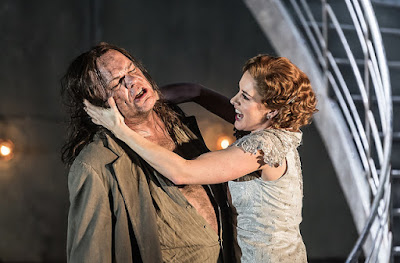 |
| Richard Strauss: Salome - Malin Byström, Duncan Meadows - Royal Opera House, Covent Garden (Photo ROH/Clive Barda) |
Reviewed by Robert Hugill on Jan 12 2018 Star rating:
Lyric soprano Malin Byström makes a lithe and wonderfully petulant teenage heroine in a strong revival
David McVicar's production of Richard Strauss' Salome at Covent Garden (revived by Barbara Lluch) remains as powerful and stylish as ever. The production has returned for the third time (seen Friday 12 January 2018), with Swedish soprano Malin Byström in the title role, plus David Butt Philip as Narraboth, Christina Bock as the Page, Michael Volle as Jokanaan, John Daszak as Herod and Michaela Schuster as Herodias, conducted by Henrik Nánási.
 |
| John Daszak, Michaela Schuster - (Photo ROH/Clive Barda) |
Malin Byström really brought out the contrast between the girlish elegance of Salome's demeanour and the virulent intensity, not to mention peversity of her desires. The 1940s setting helped, so that Byström's dress could easily have been that of an older teenager or young 20 year old, and Byström's performance was remarkably lithe, almost elfin-like at times.
Richard Strauss never did produce the revised orchestration of Salome which would have enabled lighter sopranos to sing the title role, though he talked about it. But with good management, the role remains possible for certain types of lyric. Byström debuted her Salome last June (2017) in Amsterdam, and she has recently started singing the Marschallin in Der Rosenkavalier so is clearly moving into heavier territory.
 |
| David Butt Philip, Malin Byström (Photo ROH/Clive Barda) |
The contrast was astonishing, a teenager having a little-girl strop about getting her own way, but the object of her desire so shocking. In the final scene, Herod (John Daszak), Herodias (Michaela Schuster) and the court stand by in fascinated horror as Salome slavers over the disembodied head (which leaks blood alarmingly, a nice touch in the production).
The whole production had a litheness and fluidness which matched Byström's performance. Conductor Henrik Nánási controlled the huge orchestral forces finely, drawing passionate playing from them but sophisticated too and never over-pressing things to overwhelm Byström. Nánási ensured that the music flowed admirably, and whilst it never had the driving power of some interpreters, I rather welcomed fleet, fluent style.
 |
| Michael Volle, Malin Byström (Photo ROH/Clive Barda) |
Michaela Schuster (looking remarkably like the actress Frances Barber), made a stylish and striking Herodias. An older woman, yes, but not the raddled harridan, and Schuster made the most of the wonderful one-liners that Richard Strauss/ Oscar Wilde/Hedwig Lachmann give her, such as 'Der Mond is nur der Mond, das ist alles'. But Schuster also brought out the gradual sense of disturbance as she saw the extent of her daughter's desires.
David Butt Philip was a strong Narraboth, singing with heroic lyric tone and intensity, with Christina Rock as the love-sick and pained page. Michael Volle sounded just right as Jokanaan, giving his pronouncements a warmth and beauty that was just right. The production's concept of the figure of Jokanaan is as a rather shabby, tramp-like figure very far from Salome's description of him, clearly the result of her fevered imagination.
The smaller roles were strongly cast with a mixture of youth and experience, with Dietmar Kerschbaum, Paul Curievici, Hubert Francis, Konu Kim and Jeremy White as the Jews and Kihwan Sim and Dominic Sedgwick as the Nazarenes, John Cunningham as the Cappadocian, and Levente Pall and Alan Ewing as the soldiers.
For all relish in the blood, gore, sex, violence and incest, the production also had a vein of subtlety to it with Malin Byström, John Daszak, Michaela Schuster and the cast, and conductor Henrik Nánási uncovering the multilayeredness of Strauss's music, made more remarkable for not being gone at hell-for-leather.
Elsewhere on this blog:
- Silence & Music: Paul McCreesh and Gabrieli Consort - CD review
- Kyrie - choir of St John's College, Cambridge in Poulenc, Kodaly, Janacek - Cd review
- Questing intelligence and lyrical beauty: Allan Clayton & James Baillieu in Schubert, Schumann and Purcell - concert review
- Undeservedly neglected: Rimsky-Korsakov romances - CD review
- A very personal sense of communication: Christopher Purves, Arcangelo & Jonathan Cohen in Handel - Concert review
- Compelling: Puccini's La Boheme, the King's Head Theatre production at Trafalgar Studios - opera review
- Popular as ever: Verdi's Falstaff in Antwerp - opera review
- Sense of joy: Haydn's Creation opens Kings Place's Time unwrapped - concert review
- A journey from Rossini to Richard Strauss & beyond: I chat to tenor Bruce Sledge - Interview
- Impressive debuts: Bruce Sledge and Ronnita Miller in Meyerbeer's Le prophete - Opera review
- Full of fantasy: Henning Kraggerud and the Artic Philharmonic Chamber Orchestra in Vivaldi and more - cd review
- New Year's Eve with Arcangelo - concert review
- Review of the year - 2017 in opera and concert reviews
- Review of the year - 2017 in CDs
- Home











No comments:
Post a Comment